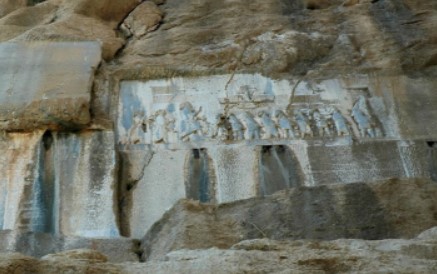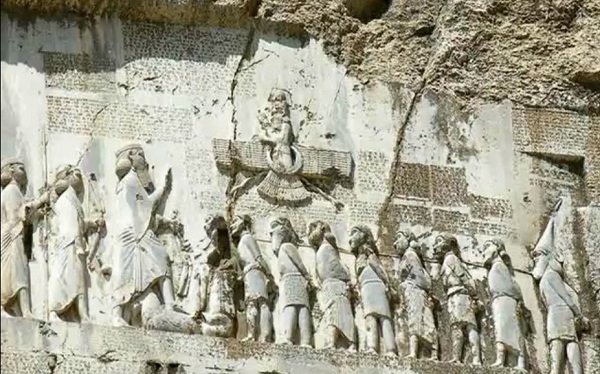A question that has arisen within the historical record (and it particular is raised by the video Origin Of The Cymry Britons, (https://www.youtube.com/watch?v=Kw8at08k254) is the idea of the kingdom called by the Assyrians Khumri. While this spelling in the Ivriyt could be (קומרי) Qumriy, it could also be (חומרי), i.e., chumriy. For purpose of this discussion, we will assume the former.
The Annals of Tiglath Pileser III (745–727 B.C.) of Assyria refers to the Northern Kingdom as Khumri. Records of the past, Society of Biblical Archeology, vol. 1, p. 51. Inscriptions on the Assyrian ruins of Sargon II (722–705 B.C.) found in Nineveh also reference the Northern Kingdom of Israel as Khumri. Layard, A.H., Discoveries in the Ruins of Nineveh and Babylon, 1853, p. 613.
There is a most significant sculpture located at Mount Bisotoun. Kermanshah, Iran. This sculpture depicts the captivity of the Khumriym.

This sculpture contains a significant inscription:

An army officer named Henry Creswicke Rawlinson risked his life in 1827, to transcribe the writings of the rock. His findings led him to conclude that there were “reasonable grounds for regarding the Gimirri, or Cimmerians, who first appeared on the confines of Assyria and Media in the seventh century B.C. as identical with the Beth-Khumri of Samaria, or the Ten Tribes of the House of Israel. R.N. Adams, Great Britain’s Rank Amongst the Nations, 1883, p. 61.
Now, we know that at some point, the Northern Kingdom, although called Yizra’el (יִזְרְעֵאל) during the reign of Ach’av, became Shomeron (Samaria) under the King called Omriy.
Melekiym Ri’shon (1 Kings) 16:15-28
In the twenty and seventh year of Aca king of Yahudah did Zimriy reign seven days in Tirtsah. And the people were encamped against Gibbethon, which belonged to the Pelishtiym. 16 And the people that were encamped heard say, Zimriy has conspired, and has also slain את eth-the king: wherefore all Yashar’el made את eth-Omriy, the captain of the host, king over Yashar’el that day in the camp. 17 And Omriy went up from Gibbethon, and all Yashar’el with him, and they besieged Tirtsah. 18 And it came to pass, when Zimriy saw that the city was taken, that he went into the palace of the king's house, and burnt את eth-the king's house over him with fire, and died, 19 For his sins which he sinned in doing evil in the sight of Yahuah, in walking in the way of Yarov`am, and in his sin which he did, to make את eth-Yashar’el to sin. 20 Now the rest of the acts of Zimriy, and his treason that he wrought, are they not written in the cepher of the chronicles of the kings of Yashar’el? 21 Then were the people of Yashar’el divided into two parts: half of the people followed Tivniy the son of Giynath, to make him king; and half followed Omriy. 22 But the people that followed Omriy prevailed את eth-against the people that followed Tivniy the son of Giynath: so Tivniy died, and Omriy reigned. 23 In the thirty and first year of Aca king of Yahudah began Omriy to reign over Yashar’el, twelve years: six years reigned he in Tirtsah. 24 And he bought את eth-the hill Shomeron of Shemer for two talents of silver, and built את eth-on the hill, and called את eth the name of the city which he built, after the name of Shemer, owner of the hill, Shomeron (Samaria). 25 But Omriy wrought evil in the eyes of Yahuah, and did worse than all that were before him. 26 For he walked in all the way of Yarov`am the son of Nevat, and in his sin wherewith he made את eth-Yashar’el to sin, to provoke את eth-Yahuah Elohai of Yashar’el to anger with their vanities. 27 Now the rest of the acts of Omriy which he did, and his might that he showed, are they not written in the cepher of the chronicles of the kings of Yashar’el? 28 So Omriy slept with his fathers, and was buried in Shomeron: and Ach’av his son reigned in his stead.
Take a look at the treachery of Zimry for a moment – for something else will be revealed.
Melekiym Ri’shon (1 Kings) 9:8-10
In the twenty and sixth year of Aca king of Yahudah began Elah the son of Ba`sha to reign over Yashar’el in Tirtsah, two years. 9 And his servant Zimriy, captain of half his chariots, conspired against him, as he was in Tirtsah, drinking himself drunk in the house of Artsa steward of his house in Tirtsah. 10 And Zimriy went in and smote him, and killed him, in the twenty and seventh year of Aca king of Yahudah, and reigned in his stead.
So what was the status of Omriy? Did he create a lasting legacy during his twelve years? It appears so:
Miykah (Micah) 6:16
For the statutes of Omriy are kept, and all the works of the house of Ach’av, and ye walk in their counsels; that I should make you a desolation, and the inhabitants thereof a hissing: therefore ye shall bear the reproach of my people.
Melekiym Sheniy (2 Kings) 8:26
Two and twenty years old was Achazyahu when he began to reign; and he reigned one year in Yerushalayim. And his mother's name was Athalyahu, the daughter of Omriy king of Yashar’el.
Divrei Hayamiym Sheniy (2 Chronicles) 22:2
Forty and two years old was Achazyahu when he began to reign, and he reigned one year in Yerushalayim. His mother's name also was Athalyahu the daughter of Omriy.
Ezra Reviy`iy (4 Ezra) 13:32-38
And the time shall be when these things shall come to pass, and the signs shall happen which I showed you before, and then shall my Son be declared, whom you saw as a man ascending. 33 And when all the people hear his voice, every man shall in their own land leave the battle they have one against another. 34 And an innumerable multitude shall be gathered together, as you saw them, willing to come, and to overcome him by fighting. 35 But he shall stand upon the top of Mount Tsiyon. 36 And Tsiyon shall come, and shall be showed to all men, being prepared and built, like as you saw the hill graven without hands. 37 And this my Son shall rebuke the wicked inventions of those nations, which for their wicked life are fallen into the tempest; 38 And shall lay before them their evil thoughts, and the torments wherewith they shall begin to be tormented, which are like unto a flame: and he shall destroy them without labour by the Torah which is like unto
Ezra Reviy`iy (4 Ezra) 13:39-45
And whereas you saw that he gathered another peaceable multitude unto him; 40 Those are the ten tribes, which were carried away prisoners out of their own land in the time of Husha the king, whom Shalman’ecer the king of Ashshur led away captive, and he carried them over the waters, and so came they into another land. 41 But they took this counsel among themselves, that they would leave the multitude of the heathen, and go forth into a further country, where never mankind dwelt, 42 That they might there guard their statutes, which they never kept in their own land. 43 And they entered into Perath by the narrow places of the river. 44 For El Elyon then showed signs for them, and held still the flood, till they were passed over. 45 For through that country there was a great way to go, namely, of a year and a half: and the same region is called Arzareth.
Let’s take a closer look at this word Arzareth. It is likely that the word in the Ivriyt would be Artsa’roth, the feminine plural of the word Artsa – a name we see identified in the passage of Melekiym Ri’shon (9) above.
The word artsa (אַרְצָא) (Strong's H777) has as its root the word erets (אֶרֶץ) (Strong's H776) which is a word generally construed to mean the earth, country, field, ground, land, wilderness or world. More likely, the full pronunciation would be Areza’roth. The general meaning would be the wildernesses.
Usually, we see the word midbar (מִדְבָּר) as the wilderness (Strong’s H4057), the book of Numbers being properly named B’midbar – in the wilderness, however, a proper and complete understanding could easily render this as b’mid’ba’aretz – in and among the wilderness.
The implications of this are enormous, as we see the prophecy of the body of Mashiach being in the wilderness. Luqas 4 gives us an idea of how long the body of Mashiach would be in the wilderness (in the Greek, the word used is eremos (ἔρημος) (Strong's G2048).
Luqas (Luke) 4:1-2
AND Yahusha being full of the Ruach Ha’Qodesh returned from the Yardan, and was led by the Ruach into the wilderness, 2 Being forty days tempted of the devil. And in those days he did eat nothing: and when they were ended, he afterward hungered.
Now consider that prophetically, a day equals a year (Yechezq’el [Ezek.] 4:6; Bemidbar [Numbers] 14:34); now consider that the year may be a Jubilee year (50 years). The body of Mashiach would then be in the wilderness being tempted by the devil for 40x50 years, or 2,000 years.
The ends of the earth: (אַפְסֵי־אָרֶץ) ephic-eretz [De 33:17; 1Sa 2:10; Psalm 59:13]
So are there a people who call themselves still by the Kingdom of Qumriy (Khumri)? Well, there are the Cymry Britons.
See Origin Of The Cymry Britons
https://www.youtube.com/watch?v=Kw8at08k254